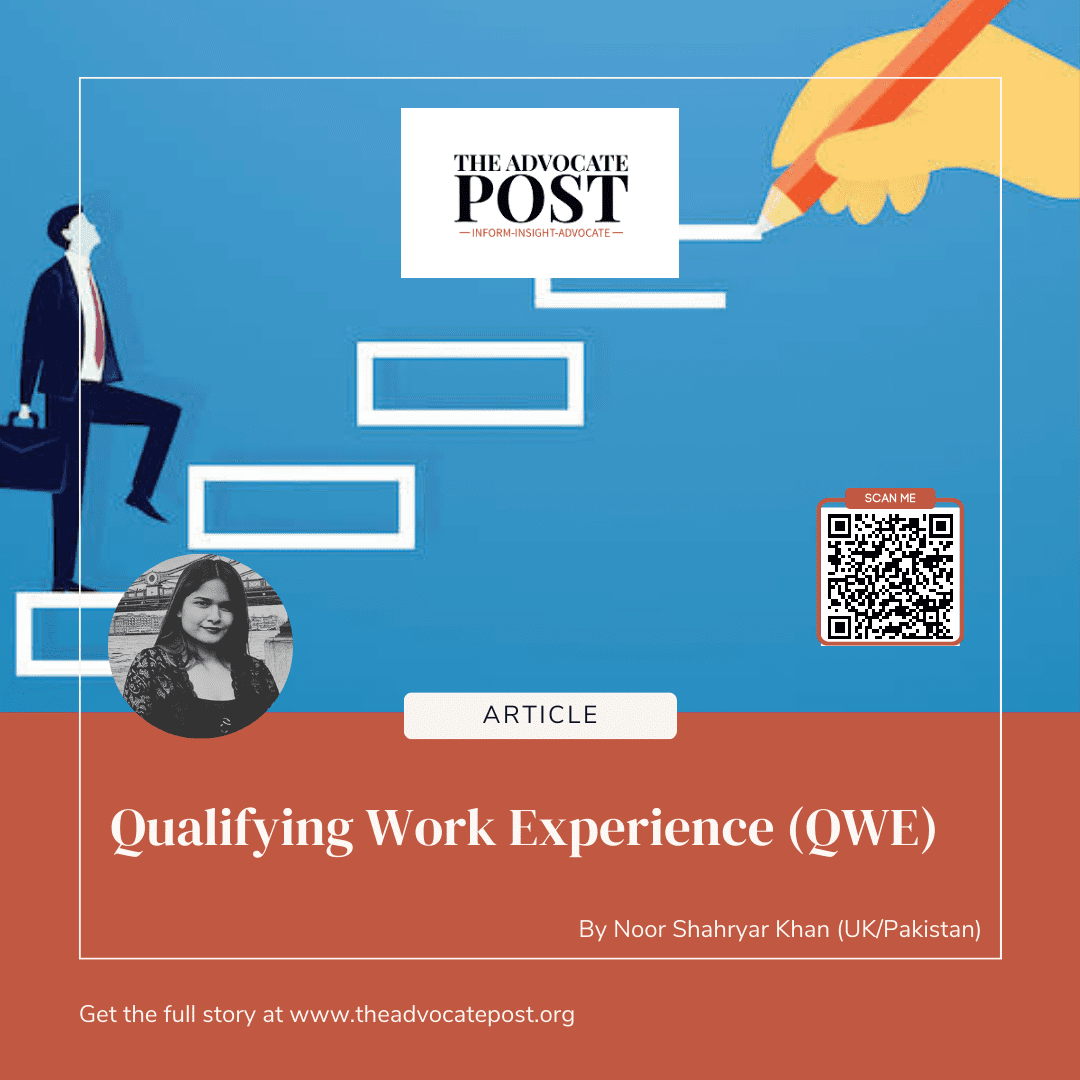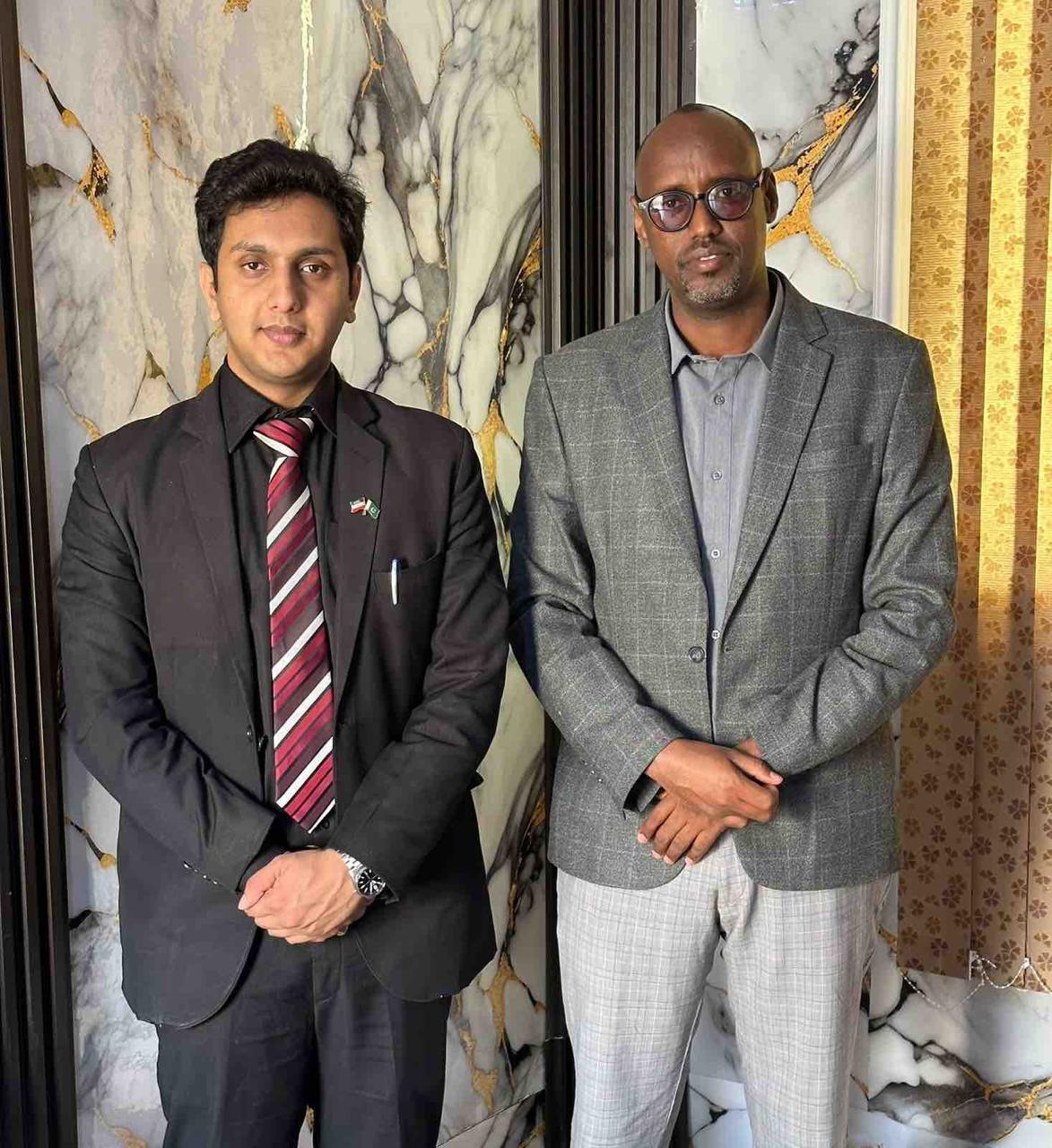By Noor Shahryar Khan (United Kingdom)
Qualifying Work Experience (QWE)
An innovative way of meeting the requirements to become a solicitor in the UK, the Solicitors Qualifying Examination (SQE), was presented on 1st September 2021.
Under the SQE, applicants must complete a minimum of two years of full-time (or equal) QWE. Below are some vital pointers to keep in mind regarding QWE:
- There isn’t a minimum period span for placements. QWE may comprise seasonal work placements or work as a paralegal as long as it is contracted.
- It is probable applicants will probably take SQE2 close to completing their QWE. The SRA doesn’t necessitate the components to be taken in a specific order, except for passing SQE1 prior to giving the SQE2.
- Companies are allowed to set and manage their teaching preparations, as long as these meet the SRA’s lowest requisites.
- Overseas trained attorneys are routinely exempted.
What is qualifying work experience?
The achievement of two years’ qualifying work experience (QWE) is one of the prerequisites applicants need to accomplish to succeed as a solicitor under the Solicitors Qualifying Exam (SQE).
All applicants must complete a minimum of two years full-time (or equal) QWE that’s grounded in legal work and the delivery of legal facilities, building a few or all of the skills set out in the statement of solicitor competence.
The SRA’s prerequisites permit a bendable tactic to be used to attain this. A solicitor or compliance officer for legal practice (COLP) must authorize the span and particulars of the experience.
They need to check that a chance to progress these skills was presented and that no problems arose throughout the work experience concerning the applicant’s nature and appropriateness to be acknowledged as a solicitor.
QWE need not be accomplished in one chunk, it may be gained at a maximum of four distinct establishments, comprising companies, legal consultancies in educational institutes, law hubs, and further suitable establishments.
There isn’t a minimum span of time for placement, though applicants and companies must deliberate whether the placement is of a long enough period to have practiced somewhat of the skills necessary.
Applicants are similarly not restricted to a single placement at each of the four establishments. They can complete numerous placements of different time phases at each body and add them together to complete the two-year QWE condition.
Numerous companies and establishments – as well as internal groups, law consultancies, and unregulated suppliers of legal facilities – can now give work that meets the requirements of QWE.
The work taken on shall meet the requirements of QWE as long as it is grounded in legal work and provides legal facilities, giving an applicant the chance to progress a few or all of the skills mentioned in the statement of solicitor competence.
When an applicant is undertaking a position with a sight to achieving QWE, the nature of the work and how it shall allow the applicant to improve the skills must be decided at the beginning of the span of QWE.
What is the QWE meant to do?
The purpose of QWE is to give applicants the chance to:
- Improve a few or all the skills defined in the statement of solicitor competence
- Practice the work of a solicitor
- Improve understanding and expertise in the zones of morals and trained manner which is an important part of being a member of the solicitors’ occupation
- Gain a bit of socialization in the place of work
- Demonstrate to upcoming employers that they have gained an experienced and detailed teaching practice, which has equipped them well for exercise
Get ready for the SQE2 assessments (for those who take on QWE prior to taking the assessments)
There are training options for the SQE2 assessments going over all the skills that are to be scrutinized. Yet, there is no replacement for actual involvement for the growth of skills. If applicants are able to improve these abilities through QWE, they might be at a point to take shorter, less costly SQE2 training courses.
Morals and professional behavior are likewise an important part of being a participant of the solicitors’ occupation, and these zones of information and ability can be advanced through QWE.
Applicants must reflect sensibly on what they want to gain from their QWE and how they can best demonstrate an actual commitment to the career.
For instance, if applicants desire to work in spaces of legal training that their educational lessons might not have equipped them for (like legal aid), then it will be significant for them to gain contact with this kind of work through QWE.
There are 18 skills, through four important zones, which are fixed out in the statement of solicitor competence. The best preparation would be to gain a comprehensive variety of knowledge across the four main areas wherever conceivable.
Applicants are not expected to grow all the skills, but the more they’re able to improve, the better equipped they’ll be for the SQE 2 assessments and their coming training as solicitors.
Thought must likewise be given to the span of time required to concentrate on each skill to completely advance an understanding of it.
Suitable management and mentoring are an important part of this procedure, and the solicitor checking QWE must be able to guarantee that the applicant is bound for a suitable variety of responsibilities and skills.
An applicant undertaking QWE before their SQE2 assessment is similarly probable to be better equipped for that assessment if they have had the chance to progress a comprehensive variety of skills.
It’s up to the distinct firm or body to regulate how best to construct their QWE offering. Some could merely propose a small period, while others could propose the complete two years compulsory.
What is significant is for employers to have precise accounts of what an applicant has completed, have precise accounts of which skills have been established, and guarantee that this is correctly established after each placement.
How should QWE be logged?
Companies and those handling volunteers must reflect on the best method for their applicants to log their QWE.
Candidates finishing their QWE at more than one placement must reflect on how best to save a log that can be opened by more than one body.
The SRA has established a model that can be used for logging. It’s not obligatory to use this model and you are allowed to log the data by the technique that best suits the applicant and company. You might find the SRA’s regulation on logging QWE valuable if you desire to grow your own model.
Whichever means you save a log, it needs to precisely log the skills established, and how they have been established so that a solicitor or COLP may approve the QWE to the SRA.
The log must be used as the foundation of fixed deliberations between the applicant and the solicitor authorizing the QWE. It must be used to guarantee that both parties are clear on which skills have been established and that the proof is satisfactory.
The log will not be needed by the SRA, it is for inside use merely. Yet, it is decent practice to save unblemished and informed logs in case there are some questions about authorizing an applicant’s QWE.
It must be reflected decent practice for companies to save logsof those hired – even on a provisional basis – and the role they have been working in, in case an applicant approaches previouscompanies to authorize QWE with hindsight. Completelysensible and balanced efforts must be made to house such needs.
The amplified elasticity that QWE proposes, paralleled with the training contract, means that numerous paralegals, or those working in comparable roles, will now find themselves able to use the work they are undertaking to count towards QWE.
This means that if they are able to pass the compulsory SQE1 and 2 assessments, they will have a strong path to qualification as a solicitor.
Numerous companies and establishments must reflect on how to bring about requirements from paralegals or additional staff (past and present) who might request to have their work established as QWE. This comprises establishments that do not presently offer teaching.
QWE needs to be established by a solicitor or COLP. Applicantsmust get their QWE established by each employer prior toexiting that place of service.
The company is merely authorizing the QWE taken on with them. The company of the previous QWE period is not expected to authorize on behalf of additional companies.
The solicitor or COLP is not required to hold a practicingcredential or work for the same body as the applicantundertaking QWE, but needs to have studied the work of the applicant through the period of QWE
Have acknowledged response from the person or peopleoverseeing the work (if not themselves), and be content to authorize the span of the work experience carried out, that it delivered the chance to improve some of the obligatory skills set out in the statement of solicitor competence, and that no personality and fittingness matters arose.
What if your QWE is not confirmed?
When you cannot reach an arrangement with your company as to whether the work you’re undertaking (or have formerlycompleted) meets the necessities for QWE, there are steps you can take to resolve this matter.
It’s valuable to set out a log of the QWE you trust you have finished, displaying what you have completed and the skills this addresses.
You must then ask the solicitor you need to authorize your QWE to evaluate this alongside the SRA’s regulation on authorizingQWE. It might be valuable to do so through a head-onconsultation, if conceivable, or you might choose to pursueprinted authorization through electronic mail if more appropriate.
At this consultation, you might request to query someone with direct knowledge of your work to support your statement ofQWE
If authorization is still not likely you must seek to comprehend, in as much detail as probable, why this is the case so that you can try to address any rational extra necessities
The SRA has made clear that it will simply become involved if it’s content that all other possibilities have been explored. Though, if you can demonstrate that you have followed their regulation to search for resolution and failed, you must contact the SRA’s Professional Ethics side.
When you’ve finished your QWE you’ll want to generate a mySRA account. Once you’ve logged in, you can start a new application and inform the SRA of your QWE. The SRA is targeting to authorize recordkeeping of an applicant’s QWE in30 days.
Since QWE can be completed at up to four distinctestablishments, with no minimum span of time for a placement, this is significantly more bendable than the present period of documented training (the ‘training contract’).
Some companies and establishments who did not feel able to offer the essential range of practice for a period of documentedpreparation, are taking on this alteration by proposing shorter periods of QWE.
This allows applicants to follow a portfolio method where they can build up an overall of two years’ QWE through diverseplacements, giving them knowledge across a broader number of zones.
There is likewise the chance for more part-time QWE. For instance, legal consultancies offering part-time placements to pupils can regulate how much this equates to as a full-time equivalent, and can then authorize this as part of an applicant’sQWE.
This method from companies and establishments would have anadvantage in terms of parity and variety. It lets applicants gain valued and essential knowledge whilst harmonizing additionalthings in their lives, such as caring obligations.
After the COVID-19 virus, numerous companies are consideringmix working models for their junior members of staff, unitingdistant working with time in the workplace.
In this manner, companies and establishments might be able to open up places to people who have before been incapable of contemplating a full-time, in-person training place.
QWE in foreign jurisdictions
QWE can take place anywhere in the world, as long as it meets the SRA’s necessities and is established by a solicitor of England and Wales.
As QWE does not need to be finished in one chunk, it might be that some or all of an applicant’s QWE can take place in a foreign jurisdiction. Fully trained overseas lawyers are excused from the QWE obligation.
As a matter of decent practice, we vouch that providers of training contracts and QWE must pay their staff a reasonable pay updated in line with the Consumer Price Index (CPI) 12-month continuing inflation degree.





